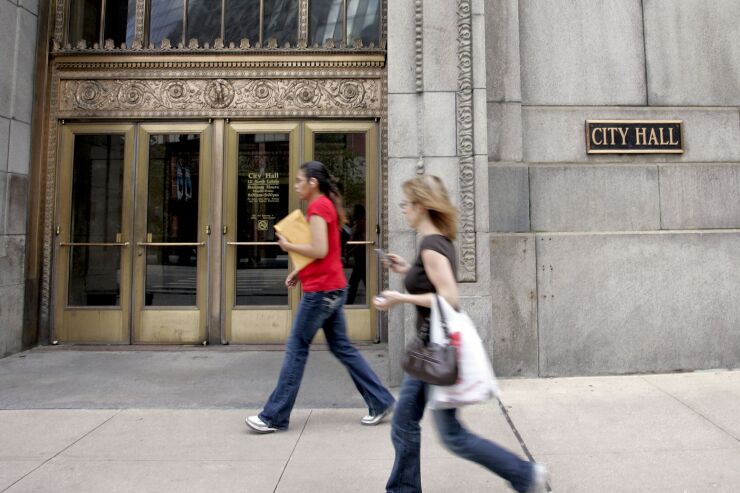S&P Global Ratings has revised the outlook on Chicago's general obligation bonds to stable from positive, the rating agency announced Thursday. S&P affirmed its BBB-plus rating on the bonds.
The downward revision reflects budgetary pressures that have not been counterbalanced by new revenue growth, S&P said. Specifically, S&P cited rising public safety labor costs, recent legislative changes to pension contributions and the ongoing costs of migrant arrivals.
"This combination exacerbates the financial strain Chicago is facing, particularly since outyear budget gaps are also sizable," the rating agency said in its report.

The city had $10.3 billion of general obligation debt outstanding as of Dec. 31, 2022, according to its
"We are disappointed by S&P's decision and surprised by the timing of the outlook change," said Chicago Chief Financial Officer Jill Jaworski. "S&P cites rising costs and pressure funding the migrant mission. The state of Illinois announced additional funding for migrant costs last week, leaving a manageable, modest gap between S&P's projections of the migrant spending in 2024 and the amounts the city and state have committed. We continue to collaboratively engage with the state and Cook County to further address these costs as a region."
When S&P
Those factors remain in effect, S&P said Thursday, but other measures that were integral to long-term structural balance, like annual property increases tied to the Consumer Price Index, have been abandoned. S&P also raised doubts about Chicago's willingness to raise new revenue.
"S&P's statement that the city has a stated unwillingness to raise taxes is not accurate, and it's unfortunate to see it cited in their report," Jaworski said. "The city has a $16.6B budget and is a home rule city with many powers to address our revenue needs. We are continuing our advance pension policy, making significant investments of over $2.7 billion to our pension funds. These actions speak to the strength of the city's finances and the commitment that continues to manage our debt and pension legacy costs."
She added: "We are considering several revenue options for their potential impact, sustainability, and fairness."
S&P said the aforementioned trio of rising costs present "greater uncertainty about Chicago's ability to maintain budget stability over the short-to-medium term."
For instance, S&P Managing Director Jane Ridley highlighted the $125 million gap between what Chicago spent on migrants in 2023 and what it budgeted to deal with the crisis in 2024.
"Due to many factors outside the city's control, it is difficult to estimate what the total costs will be," she told The Bond Buyer. "If costs exceed what Chicago has budgeted and other governments have committed, the city may be forced to make difficult decisions about how to address any overages. In our view, if it starts to impact the bottom line it could have an impact on their credit quality."
Illinois Gov. JB Pritzker said yesterday that his fiscal year 2025 budget will ask for $181.7 million to address migrant arrivals in the city of Chicago and Cook County. And Chicago's 2024 budget included $150 million to pay for migrant costs.
But S&P estimates the city spent $275 million on migrants in 2023 alone. And Illinois Comptroller Susana Mendoza's
"It seems likely that 2024's costs will exceed budgeted amounts," S&P observed in its report.
In a
Absent state and federal government support, the impact of the crisis on Chicago's bottom line could be significant, S&P added. Bipartisan immigration legislation failed in Congress earlier this month.
Meanwhile, multiple bills wending their way through the state legislature in Springfield would change pension contributions, most notably to stay compliant with IRS "safe harbor" rules around minimum benefit requirements. Those changes "will also increase costs," S&P said, and will up Chicago's required pension contributions by $69 million starting in 2025.
Those developments and others, involving tier II changes, have yet to be considered in Chicago's outyear budget forecast.
"It is our expectation that the city will continue to absorb these additional [pension] costs in a way that maintains budgetary balance, but without revenue growth or expenditures cuts elsewhere, it becomes more difficult," Ridley said. "We recognize the challenges Chicago has with these growing costs, particularly since expenditure growth of this kind is not something they have control over. However, the need to address the situation and maintain structural balance remains, and from S&P's perspective, it could affect credit quality."
S&P affirmed its BBB-plus rating and noted that Chicago's reserve levels remain high; its expenditures during 2023 will likely give it a "modest surplus" in its corporate fund at year's end; and it has not seen a decline in its tax base from falling commercial real estate property values in the Loop.
"We continue to view Chicago's economy as a strength that has allowed the city to effectuate changes that have altered its creditworthiness fundamentally," S&P said.
Chicago has enjoyed a series of positive rating actions in recent years, most recently Moody's Investors Service
Kroll Bond Rating Agency rates Chicago GOs A with a positive outlook.





